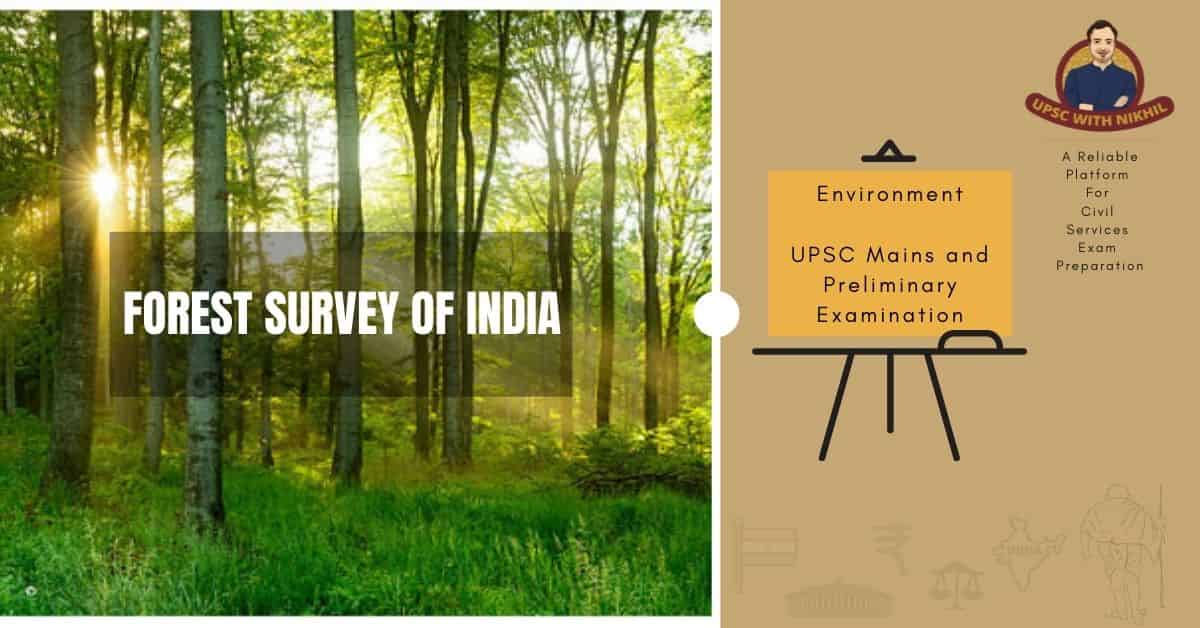Forest Survey Of India
Forest Survey of India (FSI) is a Government of India Ministry of Environment, Forest and Climate Change organisation that conducts forest surveys, studies, and research to periodically monitor the changing situation of land and forest resources and present the data for national planning, conservation, and sustainable management. It was founded in in June 1981 and is headquartered in Dehradun, Uttarakhand.
• PISFR's main goal was to determine the availability of raw materials for the establishment of wood-based industries in various parts of the country.
• The National Commission on Agriculture (NCA) recommended the establishment of a National Forest Survey Organization in 1976 in order to conduct a regular, periodic, and comprehensive forest resources survey of the country, which led to the establishment of the FSI.
• In 1986, the Government of India redefined the mandate of FSI following a critical review of its activities in order to make it more relevant to the country's rapidly changing needs and aspirations.
OBJECTIVES
1. Prepare a biennial State of Forest Report that includes an assessment of the country's current forest cover and a tracking of changes.
2. To inventory forest and non-forest areas, as well as to create a database on forest tree resources.
3. Using aerial photographs, create thematic maps at a scale of 1:50,000.
4. Assist in the collection, compilation, storage, and dissemination of spatial databases on forest resources as a nodal agency.
5. To provide forestry personnel with training in the application of technologies such as resource survey, remote sensing, GIS, and other related technologies.
6. Strengthening FSI's research and development infrastructure, as well as conducting research on applied forest survey techniques
7. Aid State/UT Forest Departments (SFD) with forest resource surveying, mapping, and inventorying.
8. On a project basis, conduct forestry-related special studies/consultancies and tailor-made training courses for SFDs and other organizations.
MAJOR ACTIVITIES
1. Assessment of Forest Cover
2. Forest area inventory.
3. Tree Inventory Outside of Forests (Rural & Urban).
4. Processing inventory data
5. Methodology Development.
6. Extension and training
7. Consultations and projects
GENETIC ENGINEERING APPRAISAL COMMITTEE (GEAC)
introduction:
• The Genetic Engineering Appraisal Committee (GEAC) was established as the apex body under the ‘Rules for Manufacture, Use, Import, Export, and Storage of Hazardous Microorganisms/Genetically Engineered Organisms or Cells 1989' in accordance with the Environment Protection Act, 1986, by the Ministry of Environment, Forest and Climate Change (MoEFCC).
• It is a non-profit organization that assesses activities involving the large-scale use of hazardous microorganisms and recombinants in industrial production, as well as environmental research.
aim:
• Its mission is to make certain that only safe and environmentally friendly activities are carried out.
• The organization also evaluates proposals for releasing genetically modified organisms and products into the environment, including experimental field trials.
structure:
• The GEAC is chaired by the ministry's Special Secretary/Additional Secretary.
• A representative from the Department of Biotechnology serves as co-chair.
• The GEAC currently has twenty-four members and meets once a month to carry out its mandated duties.
FUNCTIONS:
• To assess the environmental impact of activities involving the large-scale use of hazardous microorganisms and recombinants in research and industrial production.
• To evaluate proposals for the release of genetically engineered organisms and products into the environment, including field trials.
• Under the Environmental Protection Act, the committee or anyone authorized by it has the authority to take punitive action.
genetically modified organisms:
• India was one of the first countries to establish a biosafety system to regulate genetically modified organisms.
• The Genetic Engineering Appraisal Committee (GEAC) is also in charge of approving proposals for the release of GMOs and products, as well as experimental field trials.
• However, the Environment Minister gives GMOs his final approval.



